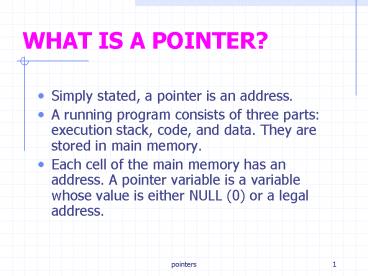WHAT IS A POINTER? - PowerPoint PPT Presentation
Title:
WHAT IS A POINTER?
Description:
WHAT IS A POINTER – PowerPoint PPT presentation
Number of Views:46
Avg rating:3.0/5.0
Title: WHAT IS A POINTER?
1
WHAT IS A POINTER?
- Simply stated, a pointer is an address.
- A running program consists of three parts
execution stack, code, and data. They are stored
in main memory. - Each cell of the main memory has an address. A
pointer variable is a variable whose value is
either NULL (0) or a legal address.
2
Why pointers?
- Pointers are used in programs to access memory
and manipulate addresses. - To get the effect of call-by-reference in C, we
must use pointers in the parameter list of a
function definition and pass addresses of
variables as arguments in the function call. - To hold the memory location of a chunk of
dynamically allocated memory block.
3
How to declare pointers
- A pointer must be defined to point to some type
of variable. - Following a proper definition, it cannot be used
to point to any other type of variable or it will
result in a "type incompatibility" error. - Declaration examples
- int p, pp // how to read?
- char cp
- float fp1, fp2, fp3
4
Example
- int k 567, p
- p k
- // p refers to k
- // p points to k
- // p contains the address of k
567
p
k
5
How to initialize pointers?
- A pointer variable must be initialized to an
address of something before you can access the
value located at that address. - Two operators
- address operator
- dereference operator
6
Example
- int x 5, y 6, z
- int px, py pz
- px x
- py y
- pz z
- pz px py // z x y (11)
- y 2 px y // y ?
7
Example
- // the dereference operator is the
- // inverse of the address operator
- double x, y, p
- p x
- y p // y x or y x
- int a, p a // OK
- int p a, a // wrong
8
Exercises
- int i 3, j 5, p i, q j, r
- double x
Expression Equivalence
p i p (i)
p i 7 p (i 7)
p ((p))
r x r (x)
7 p/q7 (((7(p)))/(q))7
(r j)p ((r (j))) (p)
Value
Value
1
illegal
3
illegal
11
15
9
Pointers to void
- void is a generic pointer type (in ANSI C).
- int x 6, px x
- void vp
- double qx
- qx px // illegal
- vp px // ok
- qx vp // ok
- qx (double) px // ok
10
Call by Reference vs Call by Value
- When variables are passed as arguments to a
function, their values are copied to the
corresponding function parameters, and variables
themselves are not changed in the calling
environment. This Call-by-Value mechanism is
strictly enforced in C. - For a function to effect Call-by-Reference,
pointers must be used in the parameter list of
the function definition. Then, when the function
is called, addresses of variables must be passed
as arguments.
11
Example
Before swap
- void swap(int p, int q)
- int tmp
- tmp p
- p q
- q tmp
- int main(void)
- int a 3, b 7
- swap(a, b)
p
a 3
q
b 7
After swap
a 7
p
b 3
q
12
Example return multi-values through pointers
- void minmax(int table, int n, int minp, int
maxp) - int i, min INT_MIN, max INT_MAX
- for (i 0 i lt n i)
- if (tablei lt min) min tablei
- else if (tablei gt max) max tablei
- minp min
- maxp max
- int main()
- int table 10, 15, 38, 27, -21, 88, 69
- int min, max
- minmax(table, 7, min, max)
- // print min and max
13
Array and Pointers
- An array name by itself is a base address, or
pointer value, and can be thought of as a
constant pointer. - The base address of an array is the initial
location in memory where the array is stored,
that is, it is the address of the first element
(index 0) of the array.
14
Relationship between Arrays and Pointers
- define N 100
- int aN, pa, sum, i
- // suppose array a has been initialized
- pa a
- pa a0
- pa a 10
- pa a10
- sum 0
- for ( pa a pa lt aN pa) sum pa
- sum 0
- for ( i 0 i lt N i) sum ai
equivalent
equivalent
15
Example return multi-values through an array
- void minmax(int table, int n, int results)
- int i, min INT_MIN, max INT_MAX
- for (i 0 i lt n i)
- if (tablei lt min) min tablei
- else if (tablei gt max) max tablei
- results0 min
- results1 max
- int main()
- int table 10, 15, 38, 27, -21, 88, 69
- int results2
- minmax(table, 7, results)
- // print results0 and result1
16
Passing arrays to functions
- int sum(int a, int n)
- int j, s 0
- for (j 0 j lt n j) s aj
- return s
Calls What gets computed
sum(v, 100) v0 v1 v99
sum(v, 88) v0 v1 v87
sum(v7, k-7) v7 v8 vk-1
sum(v 7, 2k) v7 v8 v2k6
17
Pointer Arithmetic
- Pointer arithmetic is automatically done in
units of the pointers underlying base type. - If p is a pointer to a particular type, then
- p 1 yields the correct machine address for
storing or accessing the next variable of that
type. - In a similar fashion, p i, p, p i all make
sense. - If p and q are both pointing to elements of an
array, then p q yields the integer value
representing the number of elements between p and
q.
18
Pointer Arithmetic
- The only legal arithmetic operators on pointers
are adding or subtracting an integer, or
subtracting one pointer from another. - Pointers can be compared ( ! lt lt gt gt
). Two pointers are equal only if they point to
the same location. One pointer is less than
another if it points a lower location in memory. - Dont compare pointers that dont access the
same array.
19
Another Example
- Suppose we want to implement a statistics
program for an array of data. Functions to be
implemented are - double maximum(double a, int n)
- double average(double a, int n)
- double sum(double a, int n)
Problem inefficient code because each function
involves a for loop.
20
Efficient code - using pointers
- void stat(double a, int n, double p_ave,
- double p_max, double p_sum)
- int i
- p_max p_sum a0
- for (i 1 i lt n i)
- p_sum ai
- if (p_max lt ai) p_max ai
- p_ave p_sum/(double) n
21
Pointer as return value
int search(int a, int n, int key) int p
a, ep a n while (p lt ep p ! key)
p return p ! ep ? p NULL
- int foo() // A common mistake
- int a 5
- return a
22
Pointers and Efficiency
- int a, sum, i, p, ep // assume a is
initialized - // run the following schemes 10000 times
- // scheme 1 ? 20 Sec
- sum 0
- for (i 0 i lt 10000 i) sum ai
- // scheme 2 ? 13 Sec (35 speed up)
- sum 0 p a
- for (i 0 i lt 10000 i) sum p
- // scheme 3 ? 12 Sec (40 speed up)
- sum 0 p a ep a 10000
- while (p lt ep) sum p
23
Generic Pointers
- // suppose we want to copy one array into
another - double f10, g10
- f g // illegal, f is a constant address
- memcpy(f, g, sizeof(g)) // call library
function - -------------------------------------------------
--------------- - void memcpy(void xp, const void yp, size_t
n) - unsigned char dp xp
- const unsigned char sp yp
- const unsigned char ep yp n
- while (sp lt ep) dp sp
- return xp
24
Dynamical Memory Allocation
- C requires the number of items in an array to be
known at compile time. Too big or too small? - Dynamical memory allocation allow us to specify
an arrays size at run time. - Two important library functions are malloc,
which allocates space from HEAP, and free, which
returns the space (allocated by malloc) back to
HEAP for reuse later.
25
Example
- / allocate and free an array of doubles, with
error check / - include ltstdio.hgt
- include ltstddef.hgt // definition of NULL
- include ltstdlib.hgt // definition for
malloc/free - double dcreate(int n)
- double dp
- if ((dp malloc(nsizeof(double)) ! NULL)
- return dp
- printf(dcreate dynamic allocation failed.)
- exit(0)
- void dfree(double dp)
- if (dp ! NULL) free(dp)
26
Some Comments
- Dont assume malloc will always succeed.
- Dont assume the dynamically allocated memory is
initialized to zero. - Dont modify the pointer returned by malloc.
- free only pointers obtained from malloc, and
dont access the memory after it has been freed. - Dont forget to free memory which is no longer
in use (garbage).































